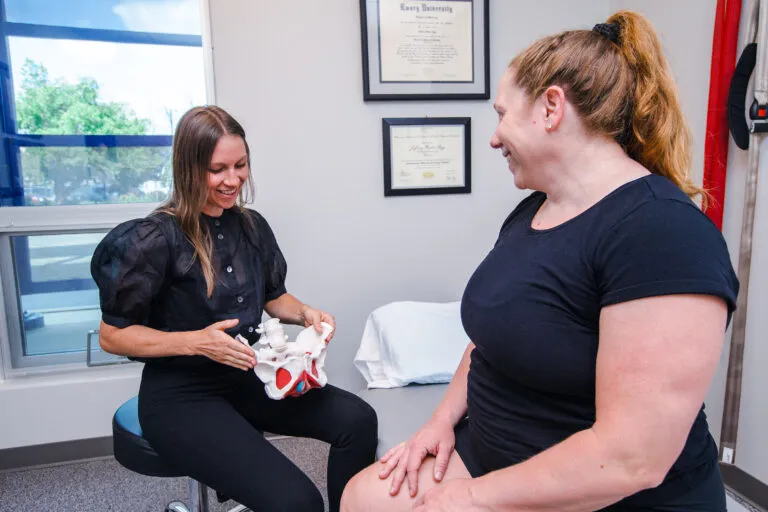A common question we discuss in our Boulder Physical Therapy and Lafayette Physical Therapy clinics regards Kegels. First and foremost, Kegels are not always appropriate and are definitely not always enough in treating pelvic floor dysfunctions! Gone are the days of doing only Kegels on a table in a room. For all the reasons Kegels are not enough, reference our blog article here. However, the Kegel does still play an important role in treatment of pelvic floor dysfunctions and must not be rid entirely from pelvic physical therapy. So here we stand in defense of the Kegel.
Kegels, aka pelvic floor muscle contractions, are still some of the best level evidence out there for the treatment of many pelvic floor dysfunctions. With such high research evidence over the years, and currently, supporting Kegels, it would be wrong for a pelvic physical therapist to never prescribe them. The following are specific conditions where the Kegel still reigns superior:
- Stress Urinary Incontinence
Leakage of urine with a cough, sneeze, jumping, physical exercise, etc is classified as stress urinary incontinence. In a 2020 clinical practice guideline (the highest form of clinical research), pelvic floor muscle training aka Kegels was graded as a treatment with the highest level of evidence supporting it. Of note, other treatments such as lifestyle changes, bladder retraining, and devices like pessaries, all also had this high level of evidence as treatments for stress incontinence.
- Urge Urinary Incontinence
Leakage of urine when urge is present or on the way to the bathroom is classified as urge incontinence. In a 2023 clinical practice guideline, pelvic floor muscle training aka Kegels was again graded as a treatment with the highest level of evidence supporting it. Behavioral intervention was also of the highest level of evidence in addition to eEgels for treatment of urge incontinence.
- Pregnancy and Postpartum
A 2020 meta-analysis (one step below a clinical practice guideline and a very high form of clinical research) explored pelvic floor muscle training aka Kegels for pregnant and postpartum populations. It was found that during pregnancy Kegels prevented late pregnancy or postpartum pelvic floor dysfunction and when done early postpartum Kegels improve pelvic floor dysfunctions.
A 2019 systematic review (one step below a meta-analysis and a very high form of clinical research) explored pelvic floor muscle training aka Kegels in those undergoing a radical prostatectomy. Kegels were found to be effective in treating post prostatectomy incontinence when performed preoperatively and postoperatively.
Many studies over the years have and continue to support Kegels as treatment for pelvic floor dysfunctions. But again, Kegels need to not just be on the table and should be progressed to functional positions and should be performed during functional and dynamic activities. And they are only a piece of a treatment plan for pelvic floor dysfunctions.
At Mend we ensure that if Kegels are appropriate, a patient can perform them effectively and that they learn how to progress them into functional activities under the guidance of a trained pelvic health physical therapist. We also look at the body as a whole and not just the pelvic floor!
Schedule an appointment in our Boulder or Lafayette clinic today.
Dufour, S., & Wu, M. (2020). No. 397 – conservative care of urinary incontinence in women. Journal of Obstetrics and Gynaecology Canada, 42(4), 510–522.
McAuley, J. Adrienne PT, DPT, MEd1; Mahoney, Amanda T. PT, DPT2; Austin, Mary M. PT, DPT3. Clinical Practice Guidelines: Rehabilitation Interventions for Urgency Urinary Incontinence, Urinary Urgency, and/or Urinary Frequency in Adult Women. Journal of Women’s & Pelvic Health Physical Therapy 47(4):p 217-236, October/December 2023.
Ren, S., Gao, Y., Yang, Z., Li, J., Xuan, R., Liu, J., … Thirupathi, A. (2020). The Effect of Pelvic Floor Muscle Training on Pelvic Floor Dysfunction in Pregnant and Postpartum Women. Physical Activity and Health, 4(1), 130–141.DOI:
Strączyńska, A., Weber-Rajek, M., Strojek, K., Piekorz, Z., Styczyńska, H., Goch, A., & Radzimińska, A. (2019). The Impact Of Pelvic Floor Muscle Training On Urinary Incontinence In Men After Radical Prostatectomy (RP) – A Systematic Review. Clinical interventions in aging, 14, 1997–2005.

